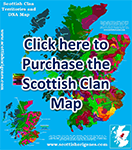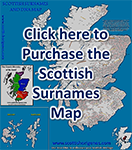You are here
The Scots Irish (Ulster Scots)
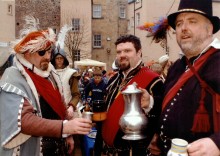 The first ever Plantations Surnames of Ireland map has been completed just in time for the Back to Our Past Event in Belfast in 2019. The map details the precise location where farmers with each Plantation Surname concentrated in early census data. Although the map features surnames of Scottish, English, Welsh, Pallantine and Gaelic Irish origin, it is the Scottish surnames that dominate in both number and frequency! It is the descendants of these Scots-Irish or rather 'Ulster-Scots' who would go on to shape the United States of America! Nearly half of all US Presidents have Ulster Scots links, and an estimated 8% of Americans claim Scots Irish ancestry.
The first ever Plantations Surnames of Ireland map has been completed just in time for the Back to Our Past Event in Belfast in 2019. The map details the precise location where farmers with each Plantation Surname concentrated in early census data. Although the map features surnames of Scottish, English, Welsh, Pallantine and Gaelic Irish origin, it is the Scottish surnames that dominate in both number and frequency! It is the descendants of these Scots-Irish or rather 'Ulster-Scots' who would go on to shape the United States of America! Nearly half of all US Presidents have Ulster Scots links, and an estimated 8% of Americans claim Scots Irish ancestry. 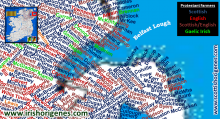 The vast majority of the Ulster Scots can trace their roots to the Scottish Lowlands, particularly along the once fluid and often lawless borderlands with England. The experience of living in a hostile borderland made them ideal colonisers in Ireland, where they would find themselves living among the sometimes hostile Native Gaelic Irish, together with the descendants of earlier Scottish settlers from the Highlands and Islands of Western Scotland. They became experienced frontiersmen in Ulster, clearing the land for settlement, dealing with frequent rebellions, until they had eventually colonised almost all of Ulster (within a few generations their descendants were on the move once more, but this time to the Americas).
The vast majority of the Ulster Scots can trace their roots to the Scottish Lowlands, particularly along the once fluid and often lawless borderlands with England. The experience of living in a hostile borderland made them ideal colonisers in Ireland, where they would find themselves living among the sometimes hostile Native Gaelic Irish, together with the descendants of earlier Scottish settlers from the Highlands and Islands of Western Scotland. They became experienced frontiersmen in Ulster, clearing the land for settlement, dealing with frequent rebellions, until they had eventually colonised almost all of Ulster (within a few generations their descendants were on the move once more, but this time to the Americas).
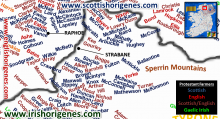 The Plantation of Ulster was not a chaotic affair, it was well planned and what the Plantation Surnames map has revealed is that whole communities moved and settled together. Today, for instance, one can explore the Plantation surnames in the farmland that surrounds a town like Ballymena in Antrim and discover surnames associated with specific locations within North Ayrshire or Wigtownshire in Scotland. However, DNA studies have revealed that the Plantation Scots that arrived in Ireland were a mixed bunch, those from North Ayrshire, Renfrewshire, Lanarkshire and Dumfriesshire were English speaking Scots of Ancient Celtic Brythonic origin with surnames like Crawford, Boyd and Paisley. Those from the Lothians, Roxburghshire and Berwickshire were English speaking Scots of Anglo-Saxon origin with surnames like Hume, Kerr, and Turnbull. In contrast, the Gaelic speaking Scots of Wigtownshire and Kirkcudbrightshire in the far southwest brought with them their distinctive Gaelic surnames like MacLellan, MacKie and MacMichael.
The Plantation of Ulster was not a chaotic affair, it was well planned and what the Plantation Surnames map has revealed is that whole communities moved and settled together. Today, for instance, one can explore the Plantation surnames in the farmland that surrounds a town like Ballymena in Antrim and discover surnames associated with specific locations within North Ayrshire or Wigtownshire in Scotland. However, DNA studies have revealed that the Plantation Scots that arrived in Ireland were a mixed bunch, those from North Ayrshire, Renfrewshire, Lanarkshire and Dumfriesshire were English speaking Scots of Ancient Celtic Brythonic origin with surnames like Crawford, Boyd and Paisley. Those from the Lothians, Roxburghshire and Berwickshire were English speaking Scots of Anglo-Saxon origin with surnames like Hume, Kerr, and Turnbull. In contrast, the Gaelic speaking Scots of Wigtownshire and Kirkcudbrightshire in the far southwest brought with them their distinctive Gaelic surnames like MacLellan, MacKie and MacMichael. 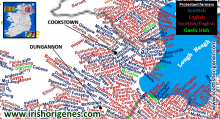 What DNA studies have also revealed is that those Gaels from Galloway were in fact the descendants of earlier Irish Gaelic settlers within Southwest Scotland (in 1100AD), the vast majority of whom also carried the Northwest Irish R-M222 paternal genetic marker. The descendants of those R-M222 Gaelic Irish settlers in Southwest Scotland returned to Ireland 500 years later as Lowland Protestant Scots and settled among their distant Gaelic Irish cousins. Many of the Gaels of Galloway would have been well aware of this earlier Irish connection; some even carried the surname 'Ireland.' The DNA has also revealed that a large proportion of the Ulster Scots who originated near Dumfries town carried exotic Mediterranean DNA markers, which have ultimately revealed that they were descended from Roman colonisers in Scotland (the remains of a Roman road and military forts can be found close to Dumfries town). The map also reveals a surprising number of Gaelic surnames with no Scottish equivalent, which implies that a large number of Gaelic Irish Clans were adsorbed into the Plantation community.
What DNA studies have also revealed is that those Gaels from Galloway were in fact the descendants of earlier Irish Gaelic settlers within Southwest Scotland (in 1100AD), the vast majority of whom also carried the Northwest Irish R-M222 paternal genetic marker. The descendants of those R-M222 Gaelic Irish settlers in Southwest Scotland returned to Ireland 500 years later as Lowland Protestant Scots and settled among their distant Gaelic Irish cousins. Many of the Gaels of Galloway would have been well aware of this earlier Irish connection; some even carried the surname 'Ireland.' The DNA has also revealed that a large proportion of the Ulster Scots who originated near Dumfries town carried exotic Mediterranean DNA markers, which have ultimately revealed that they were descended from Roman colonisers in Scotland (the remains of a Roman road and military forts can be found close to Dumfries town). The map also reveals a surprising number of Gaelic surnames with no Scottish equivalent, which implies that a large number of Gaelic Irish Clans were adsorbed into the Plantation community.
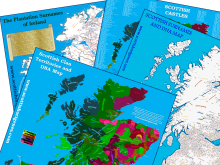 The Plantation Surnames map is the final instalment of the Scottish Origenes maps. The map can be purchased HERE (all 4 Scottish themed maps can be purchased together at a discount HERE). The maps are designed for genealogical use, but also for use with the results of some popular commercial ancestral DNA tests. For example, if you know where in Ireland your Scots Irish ancestors lived, then one can examine the surnames found in that area and identify their origin within Scotland. If you have no idea where your Scots Irish ancestors lived within Ireland, then you can take what's called an 'autosomal DNA test,' one can then examine those results, identify an area within Ireland, and then, by examining the Plantation surnames in that area, one can work back and identify where in Scotland they originated. If you want to discover where your Scots Irish ancestors lived then contact me for a FREE CONSULTATION click HERE!
The Plantation Surnames map is the final instalment of the Scottish Origenes maps. The map can be purchased HERE (all 4 Scottish themed maps can be purchased together at a discount HERE). The maps are designed for genealogical use, but also for use with the results of some popular commercial ancestral DNA tests. For example, if you know where in Ireland your Scots Irish ancestors lived, then one can examine the surnames found in that area and identify their origin within Scotland. If you have no idea where your Scots Irish ancestors lived within Ireland, then you can take what's called an 'autosomal DNA test,' one can then examine those results, identify an area within Ireland, and then, by examining the Plantation surnames in that area, one can work back and identify where in Scotland they originated. If you want to discover where your Scots Irish ancestors lived then contact me for a FREE CONSULTATION click HERE!


